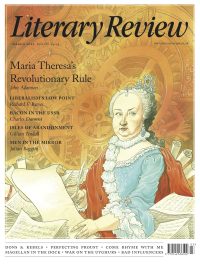Philip Parker
Land of Rune Yodelling
Extreme North: A Cultural History
By Bernd Brunner (Translated from German by Jefferson Chase)
W W Norton 225pp £21.99
Natural historian, physician, antiquary and professor of Greek, Ole Worm was a 17th-century intellectual magpie. This engaging Danish polymath had a very particular fixation. He assembled every rock fragment, every specimen, every antiquity he could get his hands on from the ‘north’. The resulting collection, the highlights of which included a ‘unicorn’ horn (which Worm himself more prosaically identified as a narwhal tusk) and a stuffed great auk, which in life he had kept as a pet, was displayed in his Copenhagen house, one of Europe’s first examples of a cabinet of curiosities. The fruits of early modern scholars’ desires to collect and make (often vain) attempts to classify and to reflect on the wonders of nature, cabinets of curiosities were often riotous mixtures of the bizarre and the instructive.
Bernd Brunner’s Extreme North is in many ways a tribute to Worm’s collection: the author uses the engraving of the Museum Wormianum commissioned by Worm’s son after his father’s death from plague as his jumping-off point. Brunner’s own cabinet of curiosities offers both a delightful series of vignettes of the north, including Mary Wollstonecraft’s description of the perpetual summer light as the ‘noon of the night’, and a gallery of the preconceptions and agendas which successive visitors have carried with them. The north, it seems, is as much about what visitors took to the region as what they actually found there.
For Brunner’s parade of notable travellers, which includes the pioneer of scientific classification Linnaeus, the poet W H Auden and the designer William Morris (the last two of whom had a particular affinity for Iceland), the first question was what exactly was meant by ‘north’. At a banal

Sign Up to our newsletter
Receive free articles, highlights from the archive, news, details of prizes, and much more.@Lit_Review
Follow Literary Review on Twitter
Twitter Feed
Under its longest-serving editor, Graydon Carter, Vanity Fair was that rare thing – a New York society magazine that published serious journalism.
@PeterPeteryork looks at what Carter got right.
Peter York - Deluxe Editions
Peter York: Deluxe Editions - When the Going Was Good: An Editor’s Adventures During the Last Golden Age of Magazines by Graydon Carter
literaryreview.co.uk
Henry James returned to America in 1904 with three objectives: to see his brother William, to deliver a series of lectures on Balzac, and to gather material for a pair of books about modern America.
Peter Rose follows James out west.
Peter Rose - The Restless Analyst
Peter Rose: The Restless Analyst - Henry James Comes Home: Rediscovering America in the Gilded Age by Peter Brooks...
literaryreview.co.uk
Vladimir Putin served his apprenticeship in the KGB toward the end of the Cold War, a period during which Western societies were infiltrated by so-called 'illegals'.
Piers Brendon examines how the culture of Soviet spycraft shaped his thinking.
Piers Brendon - Tinker, Tailor, Sleeper, Troll
Piers Brendon: Tinker, Tailor, Sleeper, Troll - The Illegals: Russia’s Most Audacious Spies and the Plot to Infiltrate the West by Shaun Walker
literaryreview.co.uk